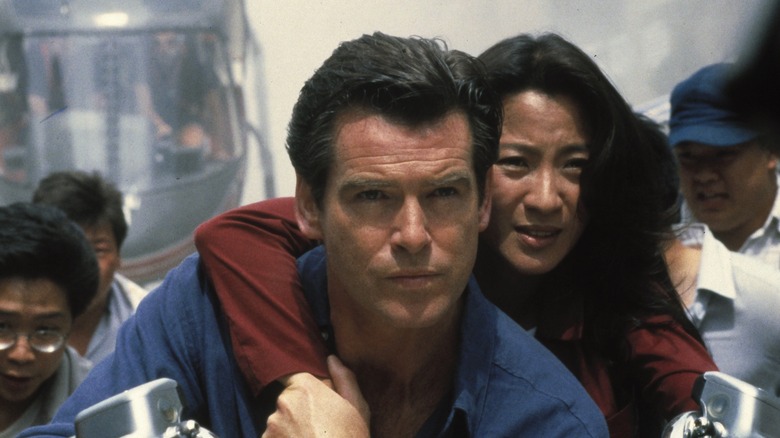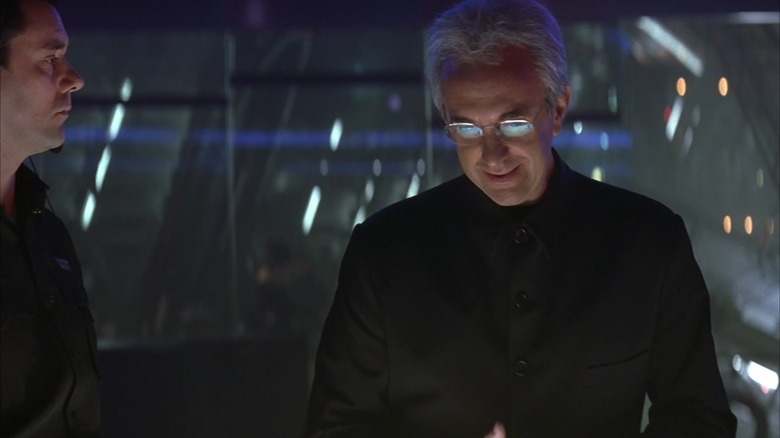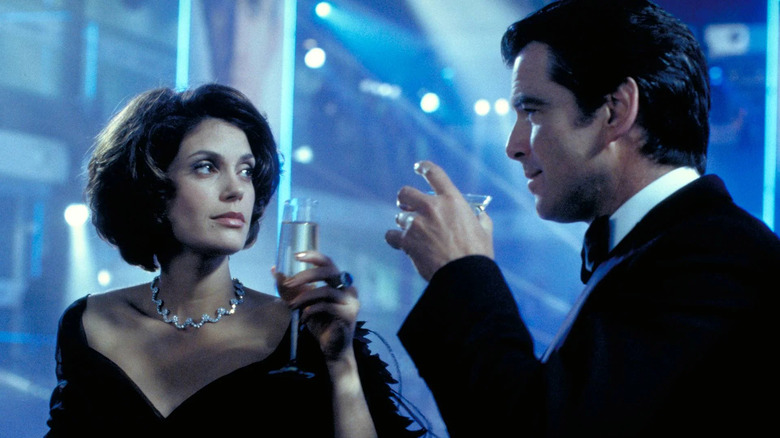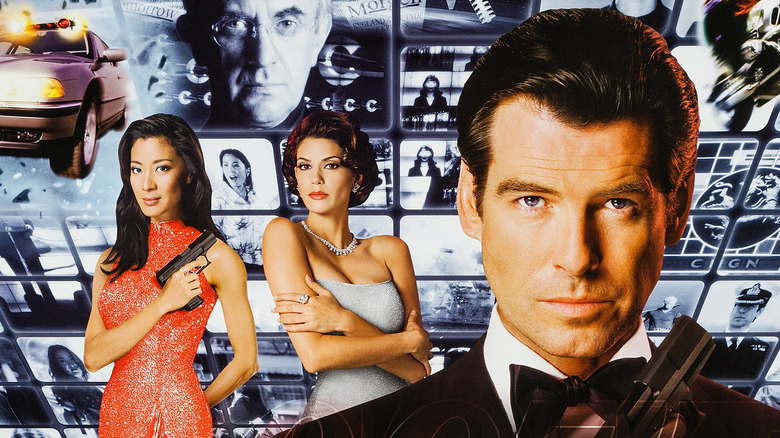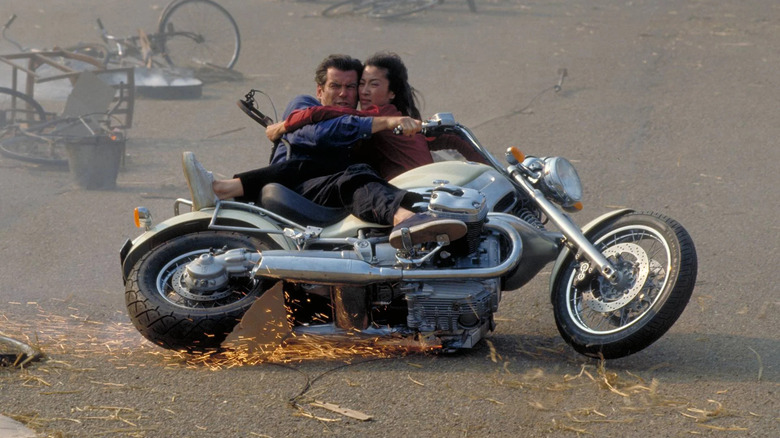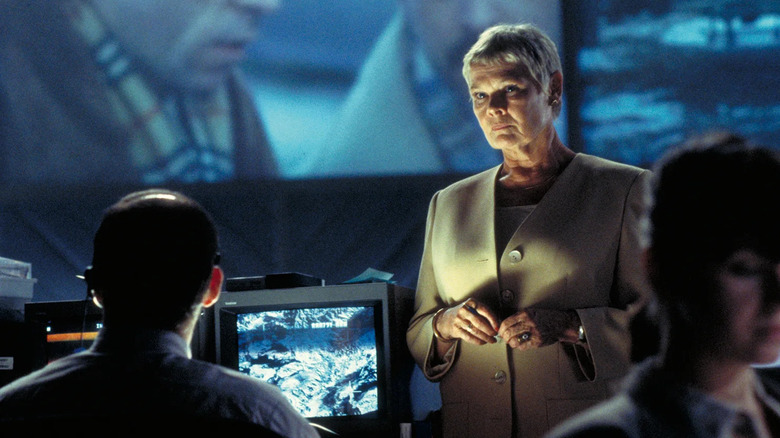Tales From The Box Office: Not Even A James Bond Movie Could Sink Titanic
(Welcome to Tales from the Box Office, our column that examines box office miracles, disasters, and everything in between, as well as what we can learn from them.)
There was a period when the "James Bond" franchise was dead for a few years, following Timothy Dalton's somewhat disappointing (commercially speaking) two-film run in the late '80s. After 1989's "License to Kill," the series was in need of reinvention, which would eventually come in a big way with 1995's massive hit "GoldenEye." Pierce Brosnan managed to bring Bond to the '90s in style, with the huge help of ace director Martin Campbell behind the camera. 007 was back in a big, bad way. But as is so often the case with a big, long-running series such as this, attention immediately turns to what comes next.
In this case, the answer to that question came in December 1997 in the form of "Tomorrow Never Dies," a largely successful venture for the still-new Brosnan era, though one that arguably could have been far more successful were it not for one pesky, massive blockbuster getting in its way: "Titanic." Indeed, as poor fortune would have it, Brosnan's second "Bond" flick just so happened to open up directly against James Cameron's record-shattering hit that, ultimately, would go on to become the highest-grossing film in history (by a wide margin) at the time.
In honor of the 25th-anniversary re-release of "Titanic," we're looking back at "Tomorrow Never Dies," as the first part in a special two-parter for this column this week. First, the movie that lost to "Titanic" in its opening weekend, followed by a second part going over the unlikely film that dethroned the blockbuster in its 16th weekend. But first, we'll look at how "Tomorrow Never Dies" drew the short straw in terms of its release date, what happened when the showdown finally came, and what lessons we might be able to learn from it all these many years later. Let's dig in, shall we?
The movie: Tomorrow Never Dies
It can't be overstated just how successful "GoldenEye" was, and just how much it revived the good name of 007. The film earned $356 million at the global box office against a very reasonable $60 million budget, making it the most profitable "Bond" movie ever up to that point. As a result, Eon Productions had no intention of sitting on their hands and letting the series lay dormant for another six years. That being the case, scripts were developed for a potential follow-up well in advance. Charles Juroe, a spokesperson for Danjiq, the holding company behind the "James Bond" films, had this to say in '96 as production on that follow-up was getting underway:
"When you get up to 17 in one series, you do things differently. You don't wait until 17 is a success to say, 'Oh, we'd better do another one.' This two-year cycle does not give Danjaq the luxury to wait another 10 or 11 months down the line to get started on the next one. They've learned to be ahead of the game. When United Artists says they're ready to do another one, they're expected to have one ready."
Though the film would come to be known as "Tomorrow Never Dies," it was actually originally titled "Tomorrow Never Lies." So, why the change? One of the writers, Bruce Feirstein, explained what happened writing for Vanity Fair in 2008:
"As we went into production, the producers and the director (Roger Spottiswoode) couldn't decide between Lies and Dies. After much debate, they finally picked Tomorrow Never Lies. They called in an assistant, dictated a fax, and she sent it off to MGM ... with a single, one-letter typo—Dies instead of Lies. The rest is celluloid history."
Problems, production problems
The journey from "GoldenEye" to "Tomorrow Never Dies," however, was a messy one that was fraught with script problems, director issues, casting hiccups, and pricey production mishaps. Albert "Cubby" Broccoli, the shepherd of the franchise from the very beginning, passed away before the film was released, but still had a hand in its creation. He commissioned storylines from writers for sequels at the same time that "GoldenEye" was being written. These storylines left producers Barbara Broccoli and Michael G. Wilson with several ready-made options. Unfortunately, they didn't feel that any of them were good as was.
To get the script in shape, a full-on writers' room of sorts was put together to overhaul the story. Seven screenwriters were flown to London, but they were required to sign waivers to bypass some Writers Guild of America rules. They weren't paid for their time either. "It was made clear to everyone that no writing was to be done,' Robert Collector said of the excursion. "It was a free weekend in London."
Eventually, a story was settled on involving a media mogul named Elliot Carver (Jonathan Pryce) who wants to build a global news empire and intends to use his media empire to fuel a war between the Western world and China — and only James Bond can stop him. Carver was nearly played by Anthony Hopkins who, instead, starred in "The Mask of Zorro," which was directed by Martin Campbell. The filmmaker passed on the opportunity to return for a second "Bond" picture and, in the end, he poached a big-name actor, putting the production in a tight spot. That was only the beginning.
James Cameron vs. James Bond
By the time the 18th "James Bond" flick was ready to start shooting, there was a big problem: where were they actually going to shoot the damn thing? Millenium Studios was occupied by "Star Wars: The Phantom Menace" at the time. And so, Eon was left to create its own studio space in a former grocery warehouse. Meanwhile, the 007 stage at Pinewood Studios was also used for the interior of Carver's stealth ship. The production raced to the finish line, with filming wrapping just 95 days before the premiere. Unfortunately, that release date they were racing to meet now had a massive, iceberg-sized obstacle in the way.
MGM and United Artists originally scheduled their film to open in December 1997 with no competition in the way. However, 20th Century Fox and Paramount Pictures had originally scheduled "Titanic" to open in early July as a summer blockbuster. When Cameron's budget ballooned to $200 million and filming ran very badly behind schedule, the release date was delayed significantly. Unfortunately for Mr. Bond, the new release date set up a battle at the box office that nobody saw coming, and that neither side wanted. Yet, it was far too late for either of them to move and thus, a showdown was in store.
The financial journey
Both "Tomorrow Never Dies" and "Titanic" opened on December 19, 1997. Prior to its release, Cameron's blockbuster was widely viewed as the underdog and, provided its hugely inflated budget, there were doubts as to whether or not it could even make its money back. Meanwhile, "James Bond" was the most successful and enduring franchise in the world up to that point. On paper, it didn't seem like much of a fight. But, as we've learned with "Avatar: The Way of Water" in more recent history, never doubt James Cameron.
Both films did well and the race was tight but, in the end, "Titanic" came in at number one that weekend with a $28.6 million haul. Meanwhile, "Tomorrow Never Dies" had to settle for second place, earning $25.1 million in ticket sales in its domestic debut. In the weeks ahead, Bond's latest adventure held pretty well, but "Titanic" simply kept picking up steam and, quite frankly, it wasn't much of a fight at all. "Tomorrow Never Dies" finished its run with $339.5 million worldwide, including $125.3 million domestic. "Titanic," on the other hand? $1.84 billion worldwide in its initial run, and $2.19 billion total through its various re-releases. It wasn't a contest in any real sense of the word.
The real kicker for MGM and United Artists is that the budget for their film ballooned as well to $110 million — nearly double what it cost to produce "GoldenEye," making it by far the most expensive "James Bond" movie up to that point. As a result, "Dies" wasn't nearly as profitable as its predecessor, adding a little insult to injury. No amount of gadgetry, charm, or tailored suits could help 007 win this battle.
The lessons contained within
Look, the "James Bond" series was ultimately fine. Brosnan went on to star in "The World is Not Enough" ($361 million worldwide/$135 million budget) and "Die Another Day" ($431.9 million worldwide/$142 million budget), before Daniel Craig took over, bringing us "Casino Royale" and "Skyfall," the highest-grossing movie in the franchise ever, among others. Losing to "Titanic" didn't hurt the series, but there is absolutely still a lesson here, and one that probably could have helped the bottom line in a big way.
MGM and United Artists rushed to meet a release date to capitalize on the success of "GoldenEye." In some way, that is understandable, as they didn't want another half-decade delay. Yet, as a result, they encountered story problems, very expensive production issues, and even casting woes. In short, everything seemed to be conspiring against the filmmakers who were trying desperately to meet that date. Yet, on the other side of the table, we had Cameron who exercised a great deal of patience (at admittedly great expense) to get his movie right, rather than rush it. Sure, "Titanic" was a once-in-a-lifetime sort of movie, but the core notion of not rushing to meet an arbitrary date does seem to carry some weight.
Had MGM not rushed things, they might have been able to keep the budget under control, and they probably wouldn't have had to directly face off against one of the biggest hits in cinematic history. Who knows? Maybe "Tomorrow Never Dies" would have made a lot more money under those proposed, different circumstances. Hindsight is always 20/20, and this is all easy to say as a guy not running a gigantic movie studio. Still, it's hard not to wonder if the decision-makers would rethink some of those decisions, provided the chance to do so.
